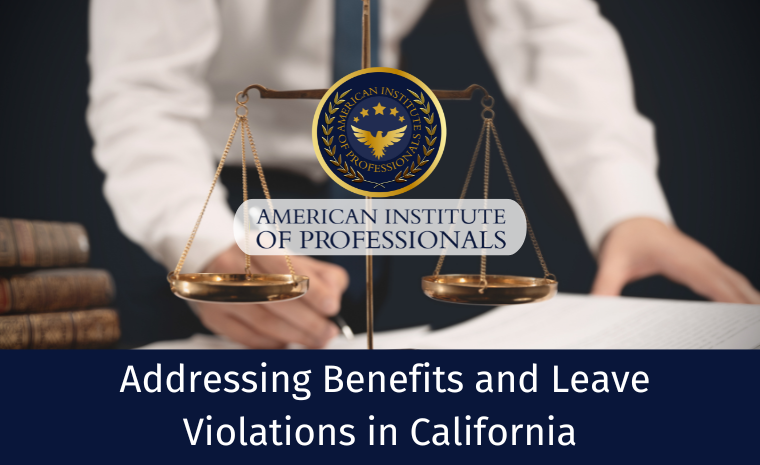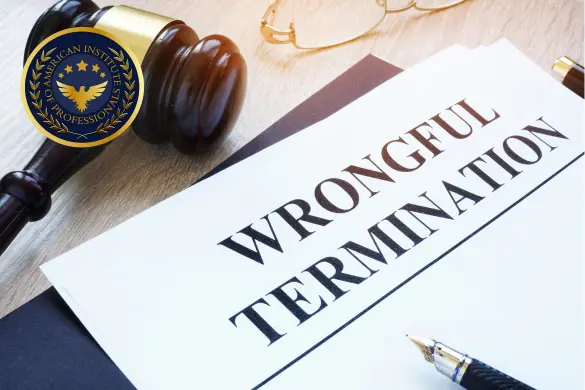In the dynamic landscape of California, employees are entitled to various benefits and leaves to safeguard their rights and well-being. These encompass minimum wage, overtime pay, meal and rest breaks, paid sick leave, and family and medical leave. However, infringements upon these entitlements can leave employees vulnerable and necessitate support.
Delve into the significance of advocating for fairness and addressing violations of benefits and leave in California. Let’s examine the pivotal facets of this issue and comprehend how employees can assert their rights.
Experienced violations of benefits and leave by your employer?

Protections for California Employees
Before taking any action, it’s imperative to grasp your rights as an employee in California. Familiarize yourself with the state’s labor laws, encompassing provisions regarding minimum wage, overtime, meal and rest breaks, family and medical leave, and other benefits. Being knowledgeable about your entitlements will empower you to identify and rectify any violations occurring in your workplace.
California labor laws afford robust protections for employees, ensuring equitable treatment and working conditions. Key rights to note include:
Minimum Wage
California sets a higher minimum wage than the federal standard. Currently, at $15.50 per hour for both employers with 26 or more employees and those with 25 or fewer employees. Stay abreast of any changes to the minimum wage and verify that you are receiving proper compensation. Most companies furnish an itemized wage statement enabling employees to review and comprehend their wage breakdown.
Overtime Pay
Employees who exceed eight hours in a day or 40 hours in a week are typically entitled to overtime pay. Overtime rates generally stand at 1.5 times the regular hourly rate. However, certain exemptions exist based on job duties and salary levels.
Meal and Rest Breaks
California mandates that employees receive meal and rest breaks during their shifts. Typically, employees are entitled to a 30-minute unpaid meal break after five hours of work and a second 30-minute meal break after ten hours. Additionally, employees should receive paid rest breaks of at least 10 minutes for every four hours worked.
Paid Sick Leave Policy
Eligible employees in California are safeguarded under the state’s paid sick leave ordinances, enabling them to take time off for medical reasons, the poor health condition of a family member, or other qualifying reasons, such as domestic violence, sexual assault, foster child abuse, or stalking. It permits them to consult the appropriate healthcare provider for their medical condition.
For most companies, a medical certification is requisite to qualify for extended sick leave. Additionally, note that the COVID-19-related supplemental paid sick leave concluded on December 31, 2022, implying that employees must adhere to the standard medical leave application process as with any other illness.
Family and Medical Leave
The California Family Rights Act (CFRA) and the federal Family and Medical Leave Act (FMLA) provide eligible employees with job-protected leave under a covered employer for various reasons, such as the birth or adoption of a child, caring for a seriously sick family member, or acting as a legal guardian for a minor.
Protection from Race and Gender Discrimination
California’s Fair Employment and Housing Act (FEHA) prohibits discrimination based on race and gender. Employers are prohibited from making employment decisions, such as hiring, promotions, pay, or termination, based on an individual’s gender and ethnicity, covering all aspects of employment.
Disability Benefits
In California, employees unable to work due to a disability may be entitled to disability benefits. The state provides two types of disability benefits: State Disability Insurance (SDI) and Paid Family Leave (PFL).
State Disability Insurance (SDI) furnishes partial wage replacement to eligible employees unable to work due to a non-work-related injury, poor health condition, or pregnancy-related condition. SDI benefits typically cover a portion of the employee’s lost wages for up to 52 weeks. To qualify for SDI benefits, employees must meet specific eligibility requirements, such as having sufficient earnings and being unable to perform their regular work duties.
Paid Family Leave (PFL) allows eligible employees to take time off work to care for a seriously ill family member or bond with a new child, providing partial wage replacement for up to eight weeks. Eligible individuals may receive benefits equal to a percentage of their wages, with a maximum weekly benefit amount. PFL benefits can be utilized intermittently or continuously within one year of the birth, adoption, or foster care placement of a child, or to care for a seriously ill family member.
By understanding your rights under the US federal government, you can identify potential violations in your workplace. If you believe your rights are being violated while performing essential functions, document any incidents or actions supporting your claim.
Identifying Benefits and Leave Violations
Benefits and leave violations can manifest in various ways, including:
- Excessive work hours per week, violating laws regulating maximum working hours, and mandatory rest periods between shifts.
- Denial of paid sick leave or family leave, contrary to California law mandating accrual of paid sick leave and the right to take time off for medical or family reasons.
- Denial of maternity leave, even after meeting the eligibility requirements outlined by CFRA and FMLA.
- Payment below minimum wage rates, contravening California’s established minimum wage rate.
- Unlawful wage deductions, unless mandated by law or agreed upon in writing.
- Retaliation for taking authorized time off constitutes a violation of labor laws.
Remain vigilant and identify employment conditions where your employer may be infringing upon your rights. Maintain records of work hours, wages, and any instances of benefits denial or adverse consequences for exercising your rights.
Seeking Resolution
In some cases, addressing the matter directly with your employer can lead to resolution. Initiate a conversation with your supervisor or HR department, presenting evidence or documentation supporting your claim, such as medical certification or wage statements. By bringing the violation to their attention, employers may rectify the situation and ensure compliance with labor laws, potentially resolving the issue.
If internal attempts at resolution fail or violations persist, seeking legal advice from an employment attorney may be necessary. An experienced attorney specializing in employment law can evaluate your case, guide you through legal processes, and help protect your rights. They can also assist in determining the viability of filing a legal claim or complaint with the appropriate government agency and explain potential remedies available, such as seeking monetary damages or pursuing a lawsuit.
Standing Up for Fairness and Taking Action
By understanding your rights, recognizing violations, seeking resolution, and consulting with legal experts when needed, you can assert your rights and hold employers accountable. Standing up for yourself not only benefits you but also contributes to a fair and just work environment for all employees in California.
Consult a skilled employment attorney specializing in protecting employee rights and obtaining the fair compensation you deserve. Raise your voice against labor violations in California!





